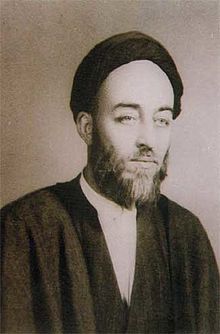Allameh Tabatabaei
| Muhammad Husayn Tabataba'i | |
|---|---|
 |
|
| Born | 16 March 1903 Tabriz, Iran |
| Died | 15 November 1981 (aged 78) Qom, Iran |
| Spouse(s) | Ghamar Sadat Mahdavi (1923–1964, her death) Mansoureh Rozbeh (1966–1981, his death) |
| Region | Iranian Scholar |
| School | Shia Twelver |
|
Main interests
|
Philosophy, Mysticism, Tafsir and Hadith |
|
Notable ideas
|
interpretation (Tafsir) of Quran with Quran |
Muhammad Husayn Tabataba'i or Seyed Mohammad Hossein Tabataba'i (Persian: علامه سید محمد حسین طباطبائی, 16 March 1903 – 15 November 1981) was one of the most prominent thinkers of philosophy and contemporary Shia Islam. He is famous for Tafsir al-Mizan, a twenty-volume work of Quranic exegesis, which he worked on from 1954 until 1972. He is commonly known as Allameh Tabataba'i and the Allameh Tabataba'i University in Tehran is named after him.
He received his earlier education in his native Tabriz city, mastering the elements of Arabic and the religious sciences. and at about the age of twenty set out for the great Shiite university of Najaf to continue more advanced studies. he studied at Najaf, under masters such as Mirza 'Ali Qadhi (in gnosis), Mirza Muhammad Husain Na'ini, Sheykh Muhammad Hossein Qaravi Esfahani (in Fiqh and Jurisprudence), Sayyid Abu'l-Qasim Khwansari (in Mathematics), as well as studying the standard texts of Avicenna's Shifa, the Asfar of Sadr al-Din Shirazi, and the Tamhid al-qawa'id of Ibn Turkah. Along with Sayyid Husayn Badkuba'i, he was a student of two of the most famous masters of the time, Sayyid Abu'l-Hasan Jilwah and Aqa 'Ali Mudarris Zunuzi.
In his later years he would often hold study sessions with Henry Corbin and Seyyed Hossein Nasr, in which not only the classical texts of divine wisdom and gnosis were discussed, but also a whole cycle of what Nasr calls comparative gnosis, in which in each session the sacred texts of one of the major religions, containing mystical and gnostic teachings, such as the Tao Te Ching, the Upanishads and the Gospel of John, were discussed and compared with Sufism and Islamic gnostic doctrines in general.
...
Wikipedia
